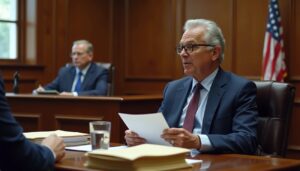Guardianship Fraud is a serious and often underreported issue affecting vulnerable individuals, particularly the elderly. Guardianship, intended to protect those who cannot manage their own affairs, can sometimes be exploited by unscrupulous individuals. Forensic accountants play a crucial role in detecting and preventing guardianship fraud, ensuring the financial well-being of those under guardianship.
What is Guardianship Fraud?
Guardianship fraud occurs when a guardian abuses their power to exploit the finances of the person they are supposed to protect. This can involve misappropriation of funds, unauthorized transactions, or coercing the ward into changing wills and other legal documents. The consequences are severe, often leaving the victim financially devastated and without the means to support themselves.
Signs of Guardianship Fraud
Forensic accountants are trained to detect various signs of financial exploitation under guardianship, including:
- Unexplained Financial Discrepancies: Unaccounted withdrawals, sudden large purchases, or frequent transfers between accounts.
- Changes in Financial Behavior: The ward’s spending patterns change significantly without reasonable explanation.
- Unauthorized Transactions: Transactions made without the knowledge or consent of the ward.
- Altered Legal Documents: Unexpected changes in wills, trusts, or beneficiary designations.
- Neglect of the Ward’s Needs: Despite having sufficient funds, the ward’s basic needs are unmet, such as unpaid medical bills or neglected property maintenance.
The Role of Forensic Accountants
Forensic accountants are essential in uncovering guardianship fraud. Here’s how they contribute:
- Conducting Financial Audits: They perform comprehensive audits of the ward’s financial records to identify discrepancies and irregularities.
- Tracing Funds: By tracing the flow of funds, forensic accountants can determine if and where money has been misappropriated.
- Reviewing Legal Documents: They examine changes in legal documents to identify signs of coercion or fraud.
- Providing Expert Testimony: In legal proceedings, forensic accountants can serve as expert witnesses, presenting their findings in a clear, understandable manner.
- Supporting Legal Action: They assist attorneys in building cases against fraudulent guardians, providing crucial evidence and analysis.
Real-Life Case Studies
- Case of Coerced Will Changes: An elderly woman under guardianship had her will altered to benefit the guardian. A forensic accountant uncovered irregularities in the signatures and financial transactions linked to the change, providing evidence that led to the guardian’s removal and criminal charges.
- Misappropriation of Funds: In another case, a guardian was found to be siphoning funds from the ward’s account for personal use. The forensic accountant traced the unauthorized transactions and helped recover a significant portion of the stolen money.
Preventing Guardianship Fraud
Preventive measures are crucial in safeguarding against guardianship fraud. Forensic accountants recommend the following strategies:
- Regular Financial Reviews: Periodic audits of the ward’s accounts can detect irregularities early.
- Strict Oversight: Establishing robust oversight mechanisms, such as requiring court approval for significant transactions, can prevent unauthorized actions.
- Transparency and Accountability: Guardians should maintain detailed records and provide regular financial reports to the court or a designated oversight body.
- Education and Awareness: Educating families and potential wards about the risks and signs of guardianship fraud can empower them to act if they suspect wrongdoing.
Legal and Ethical Considerations
Guardianship fraud cases involve complex legal and ethical issues. Forensic accountants must navigate these with diligence:
- Confidentiality: Maintaining the privacy of the ward’s financial information is paramount.
- Objectivity: Forensic accountants must remain impartial, basing their findings on objective evidence.
- Compliance with Legal Standards: They must adhere to legal standards and procedures relevant to guardianship and financial investigations.
Conclusion
Guardianship fraud is a severe violation of trust that can have devastating effects on vulnerable individuals. Forensic accountants play a pivotal role in uncovering and preventing such fraud, ensuring that guardians fulfill their duty to protect rather than exploit. Through diligent financial analysis, expert testimony, and preventive strategies, forensic accountants help safeguard the rights and well-being of those under guardianship.
If you suspect guardianship fraud or need assistance in a guardianship case, consulting a forensic accountant can provide the necessary expertise and support to protect the financial interests of the vulnerable. Their work is crucial in creating a secure environment for those who rely on guardianship for their well-being.





